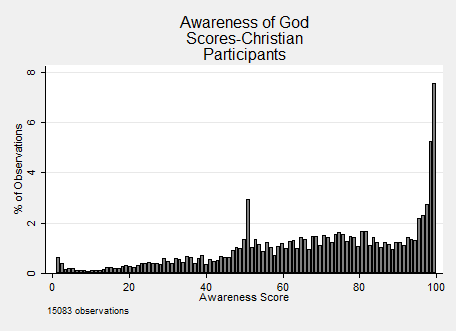The SoulPulse study has taken two years and a bunch of money to develop, and the figure addresses an obvious first question of the study: Do Christians’ vary in their awareness of God. As show, the answer is a resounding “yes,” but this raises more questions than it answers.
Here’s how to interpret this figure. SoulPulse is a ongoing, online study of daily spirituality. In it, participants sign-up at SoulPulse.org, and after taking an intake survey, they receive two daily surveys a day for two weeks, sent to their smartphone. Each of the daily surveys asks about 2 minutes of questions regarding what they are experiencing in that moment, in terms of spirituality, health, circumstances, emotions, and so on. One of the questions asks respondents how they respond to the statement “I am aware of God at this moment,” using a slider bar that ranges from 1 “not at all” to 100 “very much.”
We have data from about 1,000 respondents so far, 800 of whom are Christians. The histogram above displays their answers to the question. (The peak at “50” is a measurement artifact that we corrected after the first several hundred participants. Kind of interesting why it happened, but, beyond the scope of this post). The 800 participants generated over 15,000 responses.
Two observations.
1. There’s a lot of variation. Sometimes Christians report very low levels of this God awareness, sometimes really high, and often in-between. This is important to know from a research perspective because it shows that there’s something to be explained. In other words, why do the scores vary so much?
2. The scores are more high than low. As you can see, there are more responses on the right side than the left. In terms of numbers, the median score was 73, 21% of the responses were 50 or less, and 12% of the responses were 99 or 100–as high as the scale went. These high scores suggest that for many Christians, there is a moment-to-moment reality to their faith that transcends simply affiliating with a religious social grouping.
Now, some questions.
1. What exactly are we measuring? What are people thinking of when they answer that they are aware of God? Presumably their criteria for rating this varies by person and perhaps even within person across time. Perhaps it invokes comparison, where someone rates how aware they are now as opposed to other times in their day/week/life. So, two people could feel the level of awareness, in a quasi-objective sense, and rate it very differently. For one person that could be a highpoint, and another it’s a lowpoint. Because of this, it’s perhaps most useful to use these data to examine within-person variation. In other words, why does somebody score high at one point and low at another.
2. Is it people or situations? What this graph tells us is that there’s variation, but it doesn’t indicate the level at which the variation happens. Does it mean that Christians vary, with some Christians always scoring high, some always medium, and and some always low? Or, do we all vary across situations? E.g., sometimes a given person scores high, at other times medium, and at other times low. This is something that I’ll be looking at in future posts (but as a spoiler, it’s both.)
3. Why the variation? This graph raises an obvious question: why? Why do people sometimes score high and sometimes score low? Is it involvement in religious activities? Spiritual disciplines? Interactions with others? The stress of the day? Various social-psychological factors? These are the questions that SoulPulse was created to answer, and we’ll be looking into them for years to come.
I would love to hear what you think about this graph. In particular, what is the significance of this graph? And, what are questions that it raises?
Brad Wright
Personal blog: brewright.com
Twitter: bradley_wright












